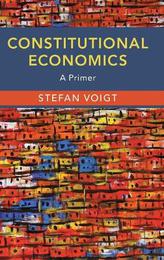
|
Constitutional Economics: A Primer
Hardback
Main Details
| Title |
Constitutional Economics: A Primer
|
| Authors and Contributors |
By (author) Stefan Voigt
|
| Physical Properties |
| Format:Hardback | | Pages:150 | | Dimensions(mm): Height 234,Width 156 |
|
| Category/Genre | Economics
Microeconomics
Development economics
Political economy |
|---|
| ISBN/Barcode |
9781108486880
|
| Classifications | Dewey:330 |
|---|
| Audience | | Professional & Vocational | | Tertiary Education (US: College) | |
|---|
| Illustrations |
Worked examples or Exercises; 2 Tables, black and white; 2 Line drawings, black and white
|
|
Publishing Details |
| Publisher |
Cambridge University Press
|
| Imprint |
Cambridge University Press
|
| Publication Date |
18 June 2020 |
| Publication Country |
United Kingdom
|
Description
Constitutional political economy has emerged as an indispensable part of political economy. This book offers a concise survey of the questions, methods, and empirical findings central to this topic. What effects - if any - do constitutions have within autocracies? Can small electoral districts help reduce corruption? Does a country's leadership affect the size of its government? Can direct democratic institutions increase politicians' accountability to citizens? Stefan Voigt, a pioneer in the field, explores these questions and more throughout the course of this cutting-edge primer. As the number of courses in constitutional economics continues to grow, this book fills an important gap in the literature. This highly original project maintains curiosity about the questions it generates, identifying potential new areas of research whilst successfully demonstrating the impact constitutional rules have on political economy.
Author Biography
Stefan Voigt is a professor at the University of Hamburg, director of its Institute of Law & Economics, and editor of Constitutional Political Economy.
Reviews'Over the last 30 years or so, 'constitutional political economy' has emerged as an important branch of political economy, or more broadly political science and economics. This Primer presents a comprehensive survey of the diverse literatures that are relevant for the field. Although primarily designed for use in the classroom, it provides an excellent introduction to the field for scholars unfamiliar with this literature. Moreover, Stefan Voigt surveys such a vast number of relevant contributions that even scholars working within the field will discover works with which they were unfamiliar.' Dennis Mueller, Emeritus Professor of Economics, University of Vienna 'This volume by one of the masters of constitutional political economy is the perfect introduction to this important line of research. It combines a state-of-the-art summary of current debates with clear, accessible writing. Highly recommended for those new to the field, but also essential reading for those who've worked in it as well.' Tom Ginsburg, Leo Spitz Professor of International Law and Professor of Political Science, University of Chicago 'What happens when the toolkit of political economy is applied to the study of constitutional rules? The result is constitutional economics-a field that legal scholars and social scientists alike should get to know, because they will be hearing a lot more about it for years to come. And one could not ask for a clearer or more knowledgeable overview of this burgeoning field than this elegant volume by Stefan Voigt. Newcomers and advanced readers alike will benefit from its concise, candid, and critical evaluation of both the existing literature and the work that remains to be done.' David Law, Chancellor's Professor, University of California, Irvine 'Comprehensiveness combined with successful brevity makes the book a valuable reference volume. An important contribution of the book is to point out studies that qualify or contradict results of past studies that have been given prominence and may have come to be regarded as having provided definitive answers to important questions. The book is suitable for researchers who want a succinct introductory overview as well as for researchers in the field who want to ensure that they have not missed essential questions and contributions.' Arye L. Hillman, Public Choice
|